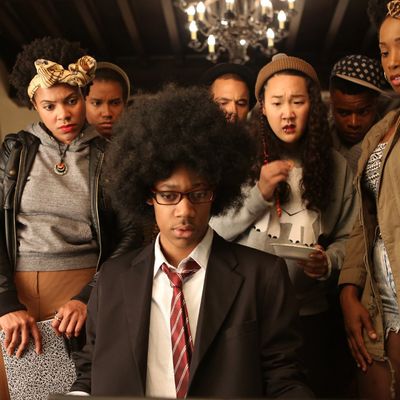
Justin Simien’s Dear White People positions itself as a skewering of racial attitudes among students and faculty at a prestigious university, but, at heart, it’s a touching, even earnest story about acceptance — or, rather, our longing for said acceptance. That the film’s satire isn’t contradicted by its sincerity is certainly a testament to the talents of this young director and his impeccable cast. But it also maybe says something about our own racial moment. The film is called Dear White People, but it might as well be called Dear Everybody. It’s hilarious, and just about everyone will wince with recognition at some point in the film.
It opens with news of a “race war” that’s been set off at the fictional Ivy League institution Winchester University, thanks to an offensive black-themed Halloween party given by some white students (complete with a mock-freestyle rap contest, blackface, toy guns, and “purple drank”). It then flashes back to the individuals and incidents that helped to set off this alleged racial conflagration. In particular, the story brings together four black students, each wrestling with their identity in different ways. Gay, shy reporter Lionel Higgins (Tyler James Williams, who played young Chris in Everybody Hates Chris) is a total outcast. He’s ostracized from his largely white residence, and although he sports a huge, proud Afro, he’s not sure that a gay guy who likes Robert Altman movies and listens to Mumford & Sons would be any more welcome at Armstrong-Foster, the school’s historically black residence.
Meanwhile, consummate student politician Troy Fairbanks (Brandon P. Bell) is the son of the school’s dean (Dennis Haysbert) and has been the head of Armstrong-Foster for a couple of years now. But his reign is about to end, as he’s just lost to Samantha White (Tessa Thompson), a fierce, outspoken DJ and blogger who hosts a radio show and video blog called “Dear White People,” in which she calls out whites for their various condescending attitudes toward blacks. (Example: “Dear White People, dating a black person just to piss off your parents is itself a form of racism.”) But Sam, too, is playing a part: She’s secretly in a relationship with a white student, and we get constant hints that she might not quite be as militant as she seems — certainly not as militant as the Black Student Union folks that she’s allied herself with.
There’s also Colandrea “Coco” Conners (Teyonah Parris), a sharp, polished, ambitious girl who has her own video blog, entitled “Doing Time at an Ivy League.” Coco’s milder observations about life at an Ivy League University don’t get nearly as many hits as “Dear White People.” She’s not extreme enough — either in her stridency or in her outrageousness. Early on, she meets with a TV producer visiting the campus to find candidates for a reality show. “Conflict is a commodity in my industry,” the producer tells her and tries to tease out Coco’s more reality-TV-friendly side after ascertaining that she’s from the South Side of Chicago. Coco isn’t having it.
It’d be easy to read allegory into these characters — and I suppose we should, a little — but it’s to Simien’s credit that he also manages to make them people, too. In part, that’s because we can relate to their dilemmas: the expectations of parents and of peers, the horror of not having anyone to turn to, the anxiety that you’ll be judged for not being enough of whatever it is people assume you are. All of these characters are hiding something, and while much of what they’re hiding relates to race in some way, scratch a little deeper and you have tried-and-true, broad existential unease — the fear that, without belonging somewhere, you’ll be left to twist between the winds.
Simien’s graceful, manicured style — symmetrical compositions, deliberate tracking shots — fits the film’s pleasant Ivy League surroundings, but it also speaks to the fragile precision of constructed identities; the very orderliness of this world reveals its artificiality on some level. The soundtrack is replete with Schubert and Tchaikovsky, sometimes played on electronic instruments, which helps enhance the sense that we’re watching something that’s both timeless and specific. (I wouldn’t be surprised if Simien were a fan of Stanley Kubrick’s Barry Lyndon, another elegantly apportioned and deceptively cosmic film about identity crises.)
All that said, the writer-director is also not afraid to polemicize and let his characters stand on soapboxes, even address the camera. It works because — like Spike Lee in Do the Right Thing and even Jean-Luc Godard back in the 1960s — he knows to playfully challenge his characters’ stridency. At one point, in a scene you can also view in the film’s teaser trailer, Samantha and other kids from the Black Student Union confront a movie-theater employee over the offensive stereotyping in Tyler Perry movies. “Can we have a movie with, you know, characters in them instead of stereotypes wrapped in Christian dogma?” Samantha asks. “Uh, most people are here to see Fang 9,” the nervous employee replies, helpfully adding, with a shrug, “It’s got 2 Chainz in it.” Sometimes, a little undercutting helps to prove your broader point.
Okay, I’ve thrown a lot of big names around — Spike Lee, Godard, Kubrick — but I’m genuinely wowed by Simien’s ability to juggle big ideas while not losing sight of his characters, by his gorgeously assured filmmaking, by the little pirouettes of dead-on observation that dance between the film’s broader strokes. Dear White People and its director are the real deal. This is one of the best feature-filmmaking debuts of recent years.


